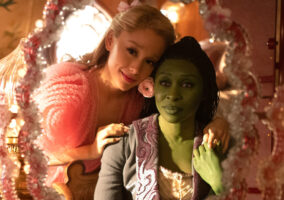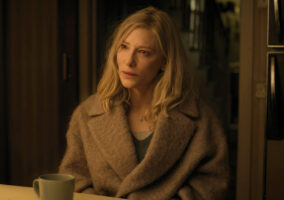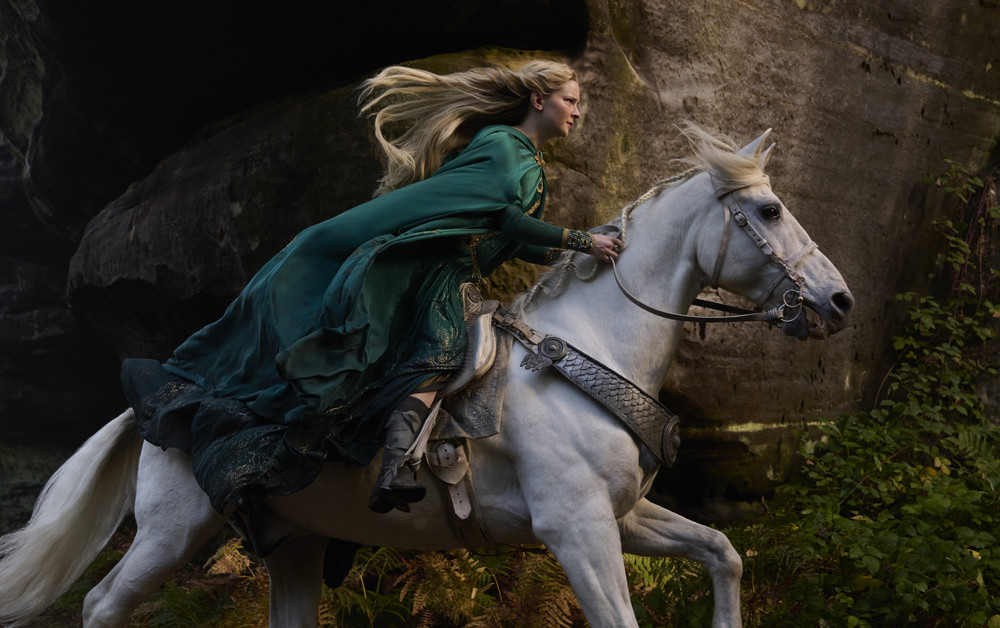
(Previously on The Lord of the Rings: The Rings of Power)
There was a moment during our first watch of the first three episodes of season 2 of The Lord of the Rings: The Rings of Power where we had to pause and consider whether it was worth it to do deep-dive recaps for the entire season. We championed the first season of the show in a string of exhaustive recaps, fully aware of the flaws in its storytelling and creative choices which left the entire enterprise feeling somewhat mid in its execution. But we felt that the grandeur of Tolkien was evident in the series and that was enough to keep us engaged and hope that the long prologue of season one would give way to a more energetic season two.
But that’s the problem with this kind of story, pieced together from the marginalia of Tolkien’s mythos, weaving in explanations for things the author never felt the need to explain further: it’s entirely a prologue. Oh sure, it’s going to lead to a huge, world-changing war, but it suffers from the same problem all prequels do. We know how it’s going to end, which tends to make the long buildup somewhat pointless. More pointedly, the rise of Sauron, much like the fall of the Republic in the Star Wars prequels, requires a story full of people making bad calls or suffering from short-sightedness. The problem is that such tales aren’t always that fun to watch, which is why stories like The Lord of the Rings and Star Wars tend to start after all of that stuff happened. We’re stuck watching a tale where Tolkien’s majestic creations are required to act like dullards and idiots, right in front of us.
To be clear, The Rings of Power is never a disaster; not really. It is, at times, a quite competently rendered fantasy story with a lot of plotlines to cover. And it’s still the most stunningly beautiful show to look at on television. But it’s trying to walk a narrow path of appealing to the type of viewer who loves the high fantasy, magic and fantastical creatures of Tolkien’s Middle Earth but who also doesn’t mind when the history or canon is wildly compressed and occasionally misinterpreted in order to tell a more televisual version of the story. In order to make Tolkien into episodic television, you have to do a lot of things that Tolkien actively worked against in his writing: multiple concurrent storylines, major developments in history happening in somewhat quick succession instead of playing out over centuries, and massive conflicts reduced down to simplistic origins. We’re afraid these first three episodes don’t have the kind of forward movement and energy we were hoping to see, but we won’t be tapping out on the show, so let’s get it into it.
We open with a confirmation of Adar’s story to Galadriel last season about him killing Sauron, which turns out to be kind of true. Jack Lowden portrays the younger, arguably prettier version of the dark lord right after the defeat of Morgoth. The scene is a bit jarring, because Sam Hazeldine has stepped in to play Adar after Joseph Mawle left the cast, so we have an opening scene were one character is deliberately being portrayed by another actor in order to show his duplicity and one character is portrayed by another actor but we’re not supposed to notice. Hazeldine’s slightly more aristocratic take on Adar is interesting, but it doesn’t quite gel with Mawle’s darker version. Conflict among the orcs is being introduced as a concept; the idea of them as sentient beings with their own agendas and desires, which tends to go against Tolkien’s characterization of them. Sauron is somewhat nervously trying to convince them to follow him, which is interesting to see, although we’re not sure how well it tracks with what we know about him. Adar clearly sees himself as their leader and somewhat surprisingly kills the dark lord instead of crowning him. The scenes of Sauron losing his physical form and regaining is is what happens when you take Tolkien and literalize it. We’re not saying that these were things the reader was never meant to see, but we’re also not convinced of the value of articulating them and rendering him as an oily mop head. This scene takes place in the same frozen wasteland and castle where we were introduced to Galadriel in the opening scene of the first season, by the way. The sequence ends with their meeting on the raft; over twenty minutes recounting things we pretty much already knew. We got some cool scenes with the sea worm and stuff, but given how glacial and unexciting the first season tended to be, this opening sequence didn’t fill us with a lot of confidence that the show had righted the ship.
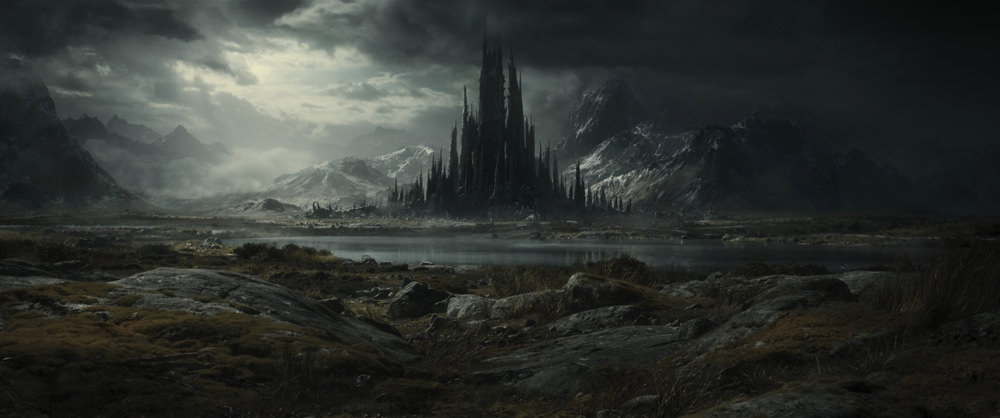
Galdriel is chasing Elrond through the woods of Lindon because he stole the three elven rings. In Lindon, both Gil-Galad and Elrond are mad at Galadriel for discovering Sauron, which is incredibly stupid because they both had a hand in attempting to banish her for insisting he was still at large and it seems kind of short-sighted of them to berate her for something almost anyone would have a problem encountering. This development simply doesn’t track at all; not without her at least calling them both out on it. We continue to be puzzled by Gil-galad’s characterization; not because we feel particularly beholden to whatever sketchy qualities Tolkien imbued him, but because we have no idea why they opted to make him so sour, threatening, and frequently wrong about things. He’s a pill, which means almost every scene with him in it drags. Benjamin Walker’s scowling performance and over-articulating isn’t helping. Elrond’s actions with the rings don’t make any sense either. You could argue that his sudden character turn is a way to underline the danger of the powers the elves were dabbling in, a fear on his part that turned out to be both true and also not so much, since we know they all kept these very rings to the end of their days or bestowed them to other people who did.
It mostly seemed like a way of introducing conflict between friends and to introduce Círdan (Ben Daniels, in a gorgeous wig) and get the ring on his finger. But like the odd characterization of Gil-Galad which inadvertently renders him as buffoon, Cirdan’s introduction only served to make him look flighty, capricious, and unreliable. We don’t know how strong a promise or vow he made to Elrond, but he broke whatever agreement that he had to destroy the rings, right in front of him, with no explanation. If the implication here is that Gil-Galad, Galadriel and Círdan are somehow enchanted by the rings, like a trio of Elven Gollums, we can’t say we love that idea, although Elrond rightly notes that Galadriel is clearly drawn to darkness. By the end of the episode, all three ringbearers are in place and Lindon is once again golden.
On the way to Rhûn, Nori and the Stranger are passing through a dry desert, without benefit of food and water. Now that he’s verbal and articulate, they have a lovely rapport and friendship. The Stranger is having dreams of a wizard’s staff that explodes when he touches it. Nori convinces him to use his power to awaken a dead tree. He loses control again and the tree explodes, revealing a feast of beetles. We spent most of the first season suggesting that the Stranger was not Gandalf, but one of the other wizards, possibly Radagast the Brown or one of the unsketched so-called “Blue Wizards.” That may yet be true but it feels like their whole relationship is being offered as an origin story for Gandalf’s long interest in the hobbits and the show is dropping some anvil-heavy hints to that effect.
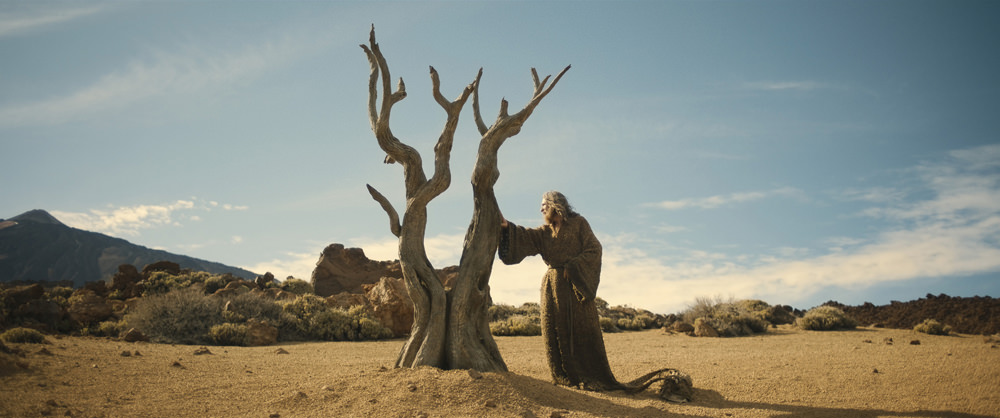
After leaving Poppy behind in last season’s finale, she returns forty minutes into this season’s premiere. Mostly it just feels like various characters are being pushed back and forth over a game board before they’re finally set on the paths we know they’re going to take. Elrond stole the rings and ran away! Now he’s in Lindon watching the elves put the rings on! Cirdan will help him destroy the rings! Now Cirdan is the rings’ biggest fanboy! Sauron leaves Eregion and goes to Mordor! Sauron leaves Mordor and goes to Eregion! These to-and-fro developments are frustrating to watch because they render previous scenes as wastes of time. Anyway, Poppy has some of Sadoc’s old maps with her and reveals that the Walking Song she sung last season (one of the more charmingly Tolkienesque moments) is actually directions to Rhun. It’s not as if this doesn’t track with Tolkien, who peppered clues and hints through pages and pages of songs and poems, but it feels like the story getting smaller somehow, as if to signal that every moment is going to have some deeper meaning later on.
In Mordor, Sauron/Halbrand tells Adar that he has news of Sauron returning in a new form and claims to have no further information. He asks Adar to release him to the elves so that he can find out more information. It’s not clear why Adar would agree to this or believe anything this supposed king had to say, although he told his trackers to follow him. Sauron follows through on his threat to Waldreg (who’s had it coming for a while now) by unleashing the warg on him. The whole sojourn in Mordor has felt somewhat pointless, telling us nothing we didn’t already know, moving none of its characters forward. Sauron shows up at the gates of Eregion with a sheepish grin and you just know Celebrimbor is going to do something dumb in response.
Next: “Where the Stars Are Strange“
Venice Film Festival: MARIA Star Angelina Jolie in Saint Laurent Next Post:
APARTMENT 7A Starring Julia Garner and Dianne Wiest | Official Trailer, Key Art and Images
Please review our Community Guidelines before posting a comment. Thank you!

